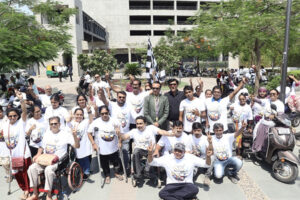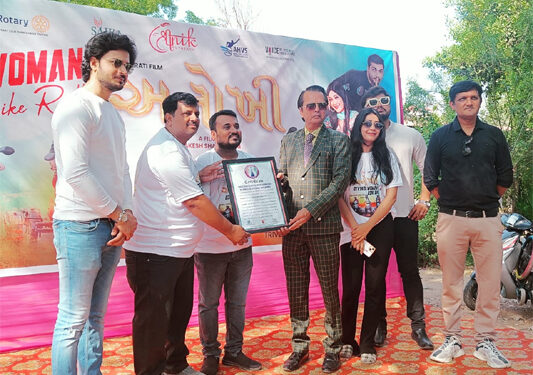GOWRI MANICKAVASAGAM
AHMEDABAD, MAY 8
Shreenik Outreach, producers of Gujarati film “Anokhee – A Unique Love Story”, on Sunday organised a bike ride for physically challenged people in order to promote accessibility for people like them creating a barrier-free environment.
After organising Anokhee- Singing & Dancing Competitions, Shreenik Outreach organized a 25-km “Divyang Women Bike Rally” which saw the participation of 51 differently abled women. This is the first Gujarati movie to be promoted by the Bike Rally of Specially Able Riders.

In recognition of this feat, Paavanbhai Solanki , Founder – President of World Records of India, conferred the World Record Certificate to ‘Anokhee’ film team comprising lead actors Aarjav Trivedi, debutant Bhumika Barot and Naksharaj, producers Miral Shah and Vishal Bhatt and director Rakesh Shah.
- After organising Anokhee- Singing & Dancing Competitions, Shreenik Outreach holds a 25-km “Divyang Women Bike Rally
- The rally’s motive is to promote accessibility for people like them creating a barrier-free environment and providing disabled-friendly access in public facilities and places
- In Ahmedabad, both BRTS and AMTS do not have facility to accommodate differently abled to board them with their vehicle for easy mobility
- The Rights of Persons with Disabilities Act 2016, and the Rights of Persons with Disabilities Rules 2017 which clearly mentions that all services in the country should be made accessible for all persons with disabilities within 2 years from the passage of the Act.
Speaking on this occasion, ‘Anokhee’ director Rakesh Shah, said, “The film revolves around a differently able girl who has lost all hope till she starts believing in herself and learns to live again. With a little support and some motivation, one can overcome any challenge in the drive towards happiness and success.”
Miral Shah and Vishal Bhatt, Founders of Shreenik Outreach said, “The main objective of this rally is to give a place to a differently abled person like a normal person. Differently abled women can also show their potential to the society. People with disabilities need support, not pity. That’s what we’re trying to convey. The movie with a strong narration of creating awareness on self-confidence among differently-abled persons, especially women will hit screens on May 12. The film is urging for change, urging people to say a differently able person doesn’t need a helping hand what the person needs is saying few simple words ‘we are with you and you can do it’.”
This “Divyang Women Bike Rally” has been ceremonially flagged off from Pooja Party plot in Keshavbagh area in Ahmedabad. After covering Andhjan Mandal , Akhbar Nagar, RTO, Gandhi Ashram, Atal Bridge on Sabarmati River Front, they returned to Pooja Party Plot via Vastrapur, Panjarapol.
Make public transports, places accessible to differently abled
Most of the rally participants lamented that despite the Supreme Court as well as the High Courts having passed several judgments since 2005, many public places are not accessible to differently abled, who constitute 14 percent of the population.

One of the participants pointed out that not even a single low-floor bus is plying in any part of the State, including smart cities Ahmedabad and Surat as on date. In Ahmedabad, both BRTS and AMTS do not have facility to accommodate differently abled to board them with their vehicle for easy mobility. It is need of the hour for private bus manufacturers to make public transport accessible to persons with disabilities, the aged, the pregnant women and children.
The rally’s motive is to promote accessibility for people like them creating a barrier-free environment and providing disabled-friendly access in public facilities and places. Public-centric buildings like schools, hospitals, police stations, courts, tourist places, etc. are the focus areas.
The Rights of Persons with Disabilities Act 2016, and the Rights of Persons with Disabilities Rules 2017 which clearly mentions that all services in the country should be made accessible for all persons with disabilities within 2 years from the passage of the Act.









